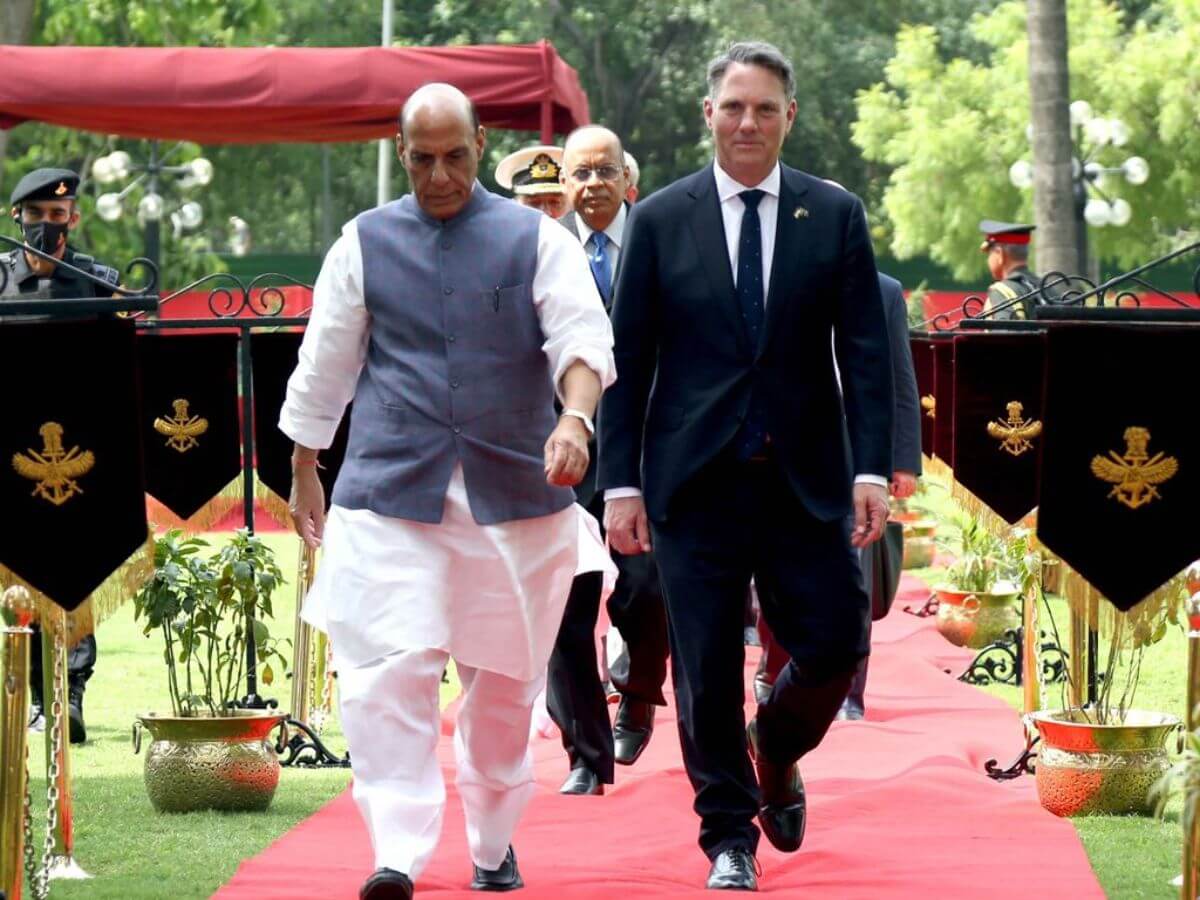Australian Defence Minister (DM) Richard Marles said on Wednesday that the Chinese assault on Indian forces in the Galwan Valley along the Line of Actual Control (LAC) two years ago was a “warning” for all countries. He stressed that Australia was among the countries that stood firmly in support of India’s sovereignty during the clash.
Marles, who is also Australia’s deputy prime minister, said “it is vital that China commits to resolving this dispute through a process of dialogue consistent with international law.” He was speaking at the National Defence College in New Delhi, where he also met with his counterpart, Rajnath Singh.
Defence Minister Richard Marles, in a speech to the National Defence College in India, says his visit this week reflects “the commitment by the Albanese government to place India at the heart of Australia’s approach to the Indo-Pacific and beyond”.
— Daniel Hurst (@danielhurstbne) June 22, 2022
Noting that the “global rules-based order matters everywhere, including in the highest place on earth,” Marles emphasised that “it is critical that China’s neighbours do not see its build-up as a risk for them.” “Because without that reassurance, it is inevitable that countries will seek to upgrade their own military capabilities in response,” he added.
He said in his speech that China has so far failed to address its military build-up with adequate diplomacy and as a result, countries have shored up their defences in response, effectively leading to an arms race with Beijing at the centre of it.
A warm welcome and excellent first meeting with @DefenceMinIndia @rajnathsingh, instrumental in advancing #defence ties.
— Richard Marles (@RichardMarlesMP) June 22, 2022
We discussed our defence partnership & our shared ambition to ensure a secure, prosperous & resilient #IndoPacific.@DefenceAust @AusHCIndia https://t.co/nXaFhuV8CV
“Insecurity is what drives an arms race,” he said, referring to concerns among countries over China’s military build-up and hostile actions in its neighbourhood.
Saying that Russia’s invasion of Ukraine is another warning for countries to strengthen their alliances, Marles called for greater security cooperation between New Delhi and Canberra. However, he stressed that such cooperation is not meant to counter China, noting, “There is nothing remarkable about two democracies working together in response to strategic change.”
Wonderful to meet India's External Affairs Minister @DrSJaishankar – a great friend of Australia.
— Richard Marles (@RichardMarlesMP) June 21, 2022
A productive discussion across the gamut of our Comprehensive Strategic Partnership, including shared commitment to build together a stronger & resilient #IndoPacific.@AusHCIndia https://t.co/axbObbgnzG
He also said that while Australia respects the right of any country to modernise its military capabilities, “large-scale military build-ups must be transparent [and] be accompanied by statecraft that reassures.” In this respect, Marles said that China is a strong country that has a powerful voice in regional and international affairs but Beijing needs to ensure the respect for the rule of law.
Marles further told ABC News that “for India and Australia, China is our largest trading partner. And for India and Australia, China is our biggest security anxiety.” The Australian DM also suggested that New Delhi and Canberra should allow each other’s military planes and ships to access and use their respective defence facilities. “Reciprocal access is a logical next step, especially for working together with India on maritime surveillance in the Bay of Bengal and the access points into the Pacific,” he told the network.
🇦🇺🇮🇳 In case you were wondering how much Australia-India relations have changed... https://t.co/3mCqdMaLjX
— Tanvi Madan (@tanvi_madan) June 22, 2022
In this respect, Marles and his Indian counterpart Rajnath Singh agreed to bolster India and Australia’s Comprehensive Strategic Partnership, build upon the existing Mutual Logistics Support Arrangement, and boost their partnership through the Joint Working Group on Defence Research and Materiel Cooperation.
“The Ministers discussed further opportunities for industrial cooperation between India and Australia to increase the resilience of supply chains and deliver capabilities to their respective defence forces,” a joint statement said. They also stressed the importance of working together to ensure “an open, free, inclusive, prosperous and rules-based Indo Pacific region,” pointing to their “shared values” of “democracy and rule of law.” Additionally, Singh said that India will participate in Australia’s upcoming Indo-Pacific Endeavour naval exercise.
Arrived in India – a top-tier partner + close friend to Australia.
— Richard Marles (@RichardMarlesMP) June 20, 2022
I look forward to advancing our ongoing defence engagement as Comprehensive Strategic Partners and reiterate our commitment for closer cooperation in the #IndoPacific. pic.twitter.com/68bxyCkxyf
In this respect, Marles described India as a “top tier partner and close friend” of Australia.
Furthermore, in a column for the Indian Express, Marles wrote, “The case for Australia making India a priority is unassailable: Australia must strengthen its understanding of and engagement with the world’s soon-to-be most populous nation and a deeply consequential power.” He added that his visit was based on the newly-inducted Albanese government’s commitment “to place India at the heart of Australia’s approach to the Indo-Pacific and beyond.”
He also outlined a plan to: boost cooperation in protecting global supply chains; leverage India’s technological, scientific, and manufacturing prowess; conduct joint naval and air exercises; jointly tackle climate change.
“Australia’s interests don’t just align with India’s, they are inextricably entwined. Expect this relationship to grow & prosper, our cooperation to deepen,” writes 🇦🇺Deputy Prime Minister & Minister for Defence @RichardMarlesMP in @IndianExpress 👇
— Barry O’Farrell AO (@AusHCIndia) June 22, 2022
🔗https://t.co/536B7q046F pic.twitter.com/mTLtmG3Rfi
“Australia’s interests don’t just align with India’s, they are inextricably entwined. Expect this relationship to grow and prosper, our cooperation to deepen,” he concluded.
Although Marles took a tough approach to China during his visit to India, he also underscored the Albanese administration’s commitment to the ‘one-China’ principle during a recent meeting with his Chinese counterpart Gen. Wei Fenghe.

